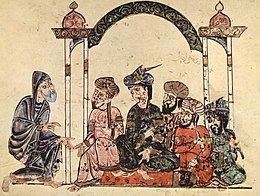
Back ديوان الحماسة Arabic Kitab al-Hamasah Esperanto Хамаса Russian Al-Hamasa Swedish Хамаса Ukrainian
| Part of a series on |
| Arabic culture |
|---|
 |
Ḥamāsah (from Arabic حماسة valour) is a well-known[1] ten-book anthology of pre-Islamic Arabic poetry, compiled in the 9th century by Abu Tammam. Along with the Asma'iyyat, Mufaddaliyat, Jamharat Ash'ar al-Arab, and Mu'allaqat, Hamasah is considered one of the primary sources of early Arabic poetry.[2] The work is especially important for having been the first Arabic anthology compiled by a poet and not a philologist and is the first in the Hamasah literary genre. The first and largest section of the work, al-ḥamāsah (valour), provides the name for several other anthologies of this type.[3]
The anthology contains a total of 884 poems, most of which are short extracts of longer poems, grouped by subject matter.[4] The selections date back to pre-Islamic, Islamic and early 'Abbasid times, although some are personally by Abu Tammam. Perhaps the oldest in the collection are those relating to the forty year long Basus War, which ended about 534 CE. Of the period of the Abbasid caliphs, under whom Abū Tammām himself lived, there are probably not more than sixteen fragments.[5]
The Ḥamāsah was probably compiled around 835 CE, while Abū Tammām was staying at Hamadan in Iran, where he had access to a very good library. It quickly acquired the status of a classic work. Saladin is said to have known it by heart.[citation needed]
- ^ Ramzi Baalbaki, The Arabic Lexicographical Tradition: From the 2nd/8th to the 12th/18th Century, pg. 89. Leiden: Brill Publishers, 2014. ISBN 9789004274013
- ^ Wen-chin Ouyang, Literary Criticism in Medieval Arabic-Islamic Culture: The Making of a Tradition, pg. 65. Edinburgh: Edinburgh University Press, 1997. ISBN 9780748608973
- ^ Orfali, Bilal (1 January 2012). "A Sketch Map of Arabic Poetry Anthologies up to the Fall of Baghdad". Journal of Arabic Literature. 43 (1): 29–59. doi:10.1163/157006412X629737.
- ^ Kirsten Eksell, "Genre in Early Arabic Poetry." Taken from Literary History: Towards a Global Perspective, vol. 2, pg. 158. Eds. Anders Pettersson, Gunilla Lindberg-Wada, Margareta Petersson and Stefan Helgesson. Berlin: Walter de Gruyter, 2006. ISBN 9783110894110
- ^ One or more of the preceding sentences incorporates text from a publication now in the public domain: Lyall, Charles James (1911). "Ḥamāsa". In Chisholm, Hugh (ed.). Encyclopædia Britannica. Vol. 12 (11th ed.). Cambridge University Press. pp. 870–871.
© MMXXIII Rich X Search. We shall prevail. All rights reserved. Rich X Search